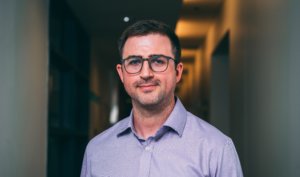Shane Harding – Research Grant – 2019
Shane Harding, Princess Margaret Cancer Centre
Project Title: “Radiotherapy-induced brain toxicity: A mechanistic basis and therapeutic opportunity”
Project Summary:
 Many brain cancers are tragic diagnoses with poor survival rates even with aggressive surgery, radiotherapy and chemotherapy. Side-effects from these treatments can have profound effects on patient quality of life. We have recently identified a molecular pathway that is activated by radiotherapy to cause inflammatory signalling. These signals trigger the immune system and enhance an exciting new treatment called immunotherapy. Importantly, these same signals are also present in patients with specific genetic conditions that lead to neurological deficits. This suggests that carefully balancing the signals produced by radiation is important maximize tumour cure and minimize toxicity.
Many brain cancers are tragic diagnoses with poor survival rates even with aggressive surgery, radiotherapy and chemotherapy. Side-effects from these treatments can have profound effects on patient quality of life. We have recently identified a molecular pathway that is activated by radiotherapy to cause inflammatory signalling. These signals trigger the immune system and enhance an exciting new treatment called immunotherapy. Importantly, these same signals are also present in patients with specific genetic conditions that lead to neurological deficits. This suggests that carefully balancing the signals produced by radiation is important maximize tumour cure and minimize toxicity.
In this project we will test our prediction that the inflammatory signals caused by radiotherapy damage the brain and lead to associated side-effects. We have 2 major goals: (1) identify new ways to track or predict toxicity during brain radiotherapy so we can better control their development and (2) to determine if a new class of drugs targeting the molecular pathways activated by radiotherapy can prevent side-effects. Together this proposal seeks to find new ways to improve brain cancer treatment and patient quality of life.
What receiving this award means to Shane:
“This support from Brain Tumour Foundation of Canada is instrumental in furthering our goal of improving radiotherapy in brain tumour patients by enhancing therapy response and minimizing toxicity.”
2020 Update
Read Shane’s 2020 mid-term update here.
February 2022 Update
Final Report: March 2023
In this project we set out to understand the response of brain tissue to radiation. During the course of these studies we identified an interesting dichotomy between two molecular subgroups that typify brain cancers. These subgroups including IDH wild-type and IDH-mutant tumours. Mutant tumours lead to a marked increase in methylation in proteins and DNA of cells. This methylation acts as a molecular flag to change the way proteins and DNA behaves. In our work we demonstrated that this mutation markedly alters the production of inflammatory signatures that are produced when cells are treated with radiation, much like is done in cancer therapy. Mutant tumours produced markedly less inflammatory signatures and were less likely to develop system-wide immunity in animal models when we combined radiotherapy with immunotherapy. We were able to trace this molecular difference to changes in how cells divide following radiation. This is the first insight to how radiation might alter methylation signals in specific regions of the genome to specifically influence the fidelity of cell division. This work has important implication for how we select patients for combination therapies and may indicate how tumours with wild-type and mutant IDH might develop differently. Importantly, this has opened a new avenue of inquiry for our laboratory that focuses on the fidelity of cell division following various cancer treatments.